The last film I saw at Cinevegas last night was Eli Roth‘s Hostel, Part II. God, what a heartless and vile thing to sit through. It’s a real shame because Roth is an above-average filmmaker. He’s got real talent and good instincts, but his head and his soul are in the sewer.
The house was almost completely full. The crowd was 95% twentysomethings. Couples, mainly. I was standing off to the left side, and something realy weird happened about 20 minutes before the end. A short Hispanic woman in her late ’20s carrying a daughter — a little over a year old, maybe 14 or 15 months — came in and stood next to me. A woman who may have been her mother was with her.
Actresses were screaming for their lives, black-red blood was flowing and a bad guy was getting his dick cut off (this produced the only loud “ewwwww!” reaction from the crowd), and the Hispanic mom was letting her 15-month-old daughter watch it. And the kid was reacting from time to time, making little sounds.
I was always pretty liberal about what I let my kids see when they were young, but you never take kids to a movie like Hostel, Part II, for Chrissake. That Hispanic mom is a degenerate — that’s all there is to it. She’s trash.
I was convulsing with disgust as I stood next to her and listened to her kid make those little goo-goo noises. I was asking myself how representative she might be of working-class moms these days. I turned around and stared at her three or four times. I couldn’t believe it, but there she was and there they were — three generations of female moviegoers watching torture porn.
Day: June 9, 2007
Zacaharek on Cotillard
“Marion Cotillard copies Edith Piaf‘s puppetlike mannerisms, her easy, bucktoothed smile, with eerie accuracy. This is the kind of biopic performance people often laud because they see how closely it mirrors the reality of its subject. But this is a good performance in spite of Cotillard’s exacting mimicry.

“Any good actor can imitate tics and mannerisms, but Cotillard has so much life in her that the spirit of Piaf shines through the exaggerated, shrugging gestures and cartoonishly tweaked eyebrows. Cotillard makes the necessary leap between mere impersonation and a bracingly sympathetic rendering of one woman’s suffering, as well as her occasional joys.” — from Stephanie Zacahrek‘s review of La Vie en Rose.
Wekkend numbers
Ocean’s Thirteen took in $12.6 million yesterday in 3,565 theaters, and should wind up with something close to $40 million by Sunday night. (Maybe less — it’s not anyone’s idea of a knockout caper flick.) Knocked Up came in second yesterday, beating the third-place Pirates of the Caribbean: At World’s End by a nose, but it managed this on only 2876 screens compared to POTC‘s 4002. The animated Surf’s Up was fourth with $5.7 million in 3,528 situations, and Shrek The Third was fifth with $4.3 million and a projected $16 million for the weekend. Eli Roth‘s Hostel, Part II came in sixth with $3.4 million earned yesterday and a projected $10 million or less by Sunday night — a lot less than the $19.5 million that the original Hostel took in.
“Sopranos” finale
I don’t want Tony Soprano to die tomorrow night, and something is telling me he won’t. Tomorow night’s finale won’t end “happily,” but I don’t see a bullet or two putting a cap on seven years of great drama. That would be too easy, too pat. A major letdown, in fact.
Sopranos creator David Chase has done too good a job of making James Gandolfini‘s New Jersey gangster not just human and occasionally vulnerable, but us. No matter what Chase may say to interviewers, he’s on Tony’s team through and through. One reason he writes Tony Soprano so well is because he’s essentially writing about his own dark places, and I don’t think Chase hates himself sufficiently to want to kill his own. If he does, I will feel saddened, let down…almost betrayed.
Here’s a final-episode prediction poll piece by various Salon writers.
Salon piece on Paris Hilton
“Let’s just pray that those bad prison sheets scratch her tender white ass enough to get her out of our faces for good. Because we certainly didn’t ask for this, either. No matter how the talking heads and pundits have tried to convince us that Paris is a reflection of our shallowness and stupidity as a culture, most of us have never wanted her to be a symbol of anything. Is the crotch flash an act of subversion, in which Hilton channels the paparazzi to put her image on every cover, from tabloids to respected newspapers alike? Is Hilton, like her understudies Lindsay Lohan and Britney Spears, just a frightened child, overwhelmed and intoxicated by all of the attention the media gives her?” — from Heather Havrilesky and Rebecca Traister‘s Salon piece on the adventures of Paris Hilton.
Cinevegas stuff
I flew to Las Vegas late yesterday afternoon to sample the 2007 Cinevegas Film Festival — just a weekend’s worth this time, I’m afraid. It’s a little after 9 a.m. now. I went downstairs for breakfast around 6:30 a.m. and there were a fair number of party vampires — raggedy guys in their 30s and 40s, groups of young girls in short hottie dresses — who hadn’t yet gone to sleep.
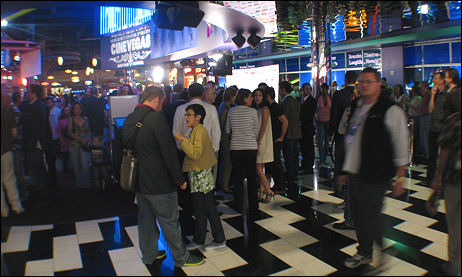
BWR/Cinevegas publicist Chris Libby (bag slung over shoulder) in lobby of Brenden Theatres’ Palm Casino plex — Friday, 6.8.07, 7:50 pm.
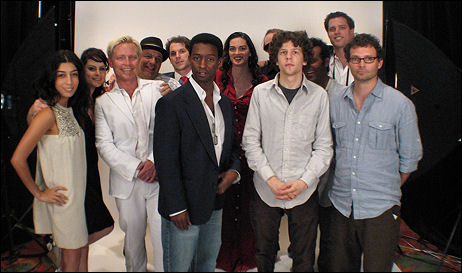
Cast and crew of The Living Wake (star Jessie Eisenberg is the only one I know — I’ll get the names straight later on — publicist Mickey Cottrell is at far right in larger version of photo) — Friday, 6.8.07, 8:05 pm
Vegas is a great place to visit for the first 24 hours, and an awesome place to be when you’ve only been here a few. You can feel the time-to-get-wild attitude when you first walk into your hotel. The problem is how the this environment makes you feel on the second, third and fourth days, etc. I’m not going to rant about this. I just prefer trudging around the Valley of Fire (about 20 miles north of town) to playing blackjack and eyeballing the waitresses.
I tried to see the second half of Simon Bross‘s Bad Habits (Malos Habitos), but festival volunteers blocked me at the entry point. They’d been told to let press people into films only from the very beginning; the guy I spoke to actually told me to “get in line” for the next show. So I asked BWR publicist Chris Libby to facilitate, and I’m told today will be different.
I got into the 8:30 pm screening of Sol Tryon‘s The Living Wake, which the press notes say is “an intelligent, beautifully acted and gloriously funny independent comedy.” It’s about a self-proclaimed artist and genius (Mike O’Connell) who wants to kill himself, and has asked his best friend (Jesse Eisenberg) to chronicle his final hours, including a final life-celebration party — i.e., a “living wake.”
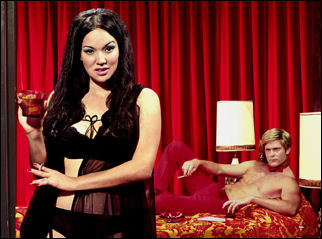
Viva‘s Anna Biller
I could hear people laughing as it played, and I know several songs were sung. But I just got back from Europe two days ago, and the urge to crash around dinner hour is overwhelming. You feel like barbells are pulling your eyelids down. I drank a double espresso and a Red Bull before the film started, but I was gone five minutes after the lights went down. The Living Wake is playing again on Sunday at 1:30 pm, at which point I’ll try again.
I managed to avoid the get-in-line guy and stumbled into Anna Biller‘s Viva around 10 pm. It’s a wink-wink soft-core sex movie mixed in with an early ’70s design movie (clothes, home interiors, etc.) that apes the overlit photography and bad acting of sexploitation films of the ’70s. Nothing like Radley Metzger‘s — more like Russ Meyer‘s without the class.
It’s pretty good in this sense, but after a while bad acting is bad acting, and Biller — who stars as well as directs — reads her lines with the exact same inflections and expressions (Betty Boop voice, come-hither look, arched eyebrows) over and over and over. The film is almost doing the same genre-tribute routine that Grindhouse did, but its low-grade aspects are a little too convincing.
Psychedelic Legacy
There are several sharp, true-blue observations in Jody Rosen‘s Slate piece about the 40th anniversary of the Beatles’ Sgt. Pepper’s Lonely Hearts Club Band, which was released in England on June 1, 1967 but hit U.S. stores on Wednesday, June 3, 1967. The article is mainly about the album’s musical grooves and innovations, but it also acknowledges the social rumblings and currents of that time, and on this level it’s almost staggering to realize that Rosen totally ignores a seismic impact upon the culture at large that this historic album, almost all by itself, brought about.
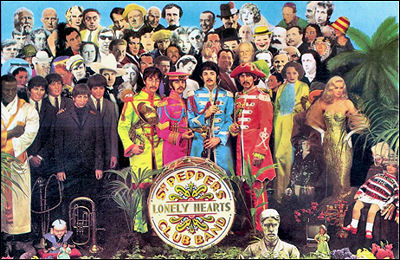
Astonishingly and rather suddenly, beginning in June 1967 and continuing long after that, Sgt. Pepper’s Lonely Hearts Club Band seduced a significant portion of America’s middle-class youths into trying the psychedelic drug adventure, which in turn led to a mass injection of satori/God-head consciousness that literally upended liberal American society.
And it was all primarily the doing of LSD — a substance that created such a profound re-ordering and a scrambling of established grooves in one’s thought processes that it allowed for the mystical to slip through and become real — along with the somewhat milder mescaline and peyote. Tens of thousands of American kids wouldn’t have tried these drugs if the Beatles hadn’t conveyed through the easily decipherable symbology of Sgt. Pepper that spiritual seeking and possible transformation through psychedelia was the Great Youth Adventure of the moment — an adventure, a quest and a challenge that only the dumbest or most regressive or most chicken-hearted twentysomethings of that time ignored or hid from.
In short, by triggering a dam burst of pot and psychedelic drug experimentation among under-25 youths, Sgt. Pepper’s Lonely Hearts Club Band led tens of thousands of American kids into the realms of spiritual satori that Herman Hesse and Aldous Huxley had written about. Suddenly a radiant new world of Eastern mystical transcendence and transformation became a tangible thing among the educated free spirits, hippies and pseudo-hippies of that era. This found its ultimate social fruit in the middle-class spiritual movement of the late ’60s and early ’70s that Tom Wolfe later described as “the Third Great Awakening.”
“Very few people went into the hippie life with religious intentions, but many came out of it absolutely righteous,” Wolfe wrote. “The sheer power of the drug LSD is not to be underestimated.”
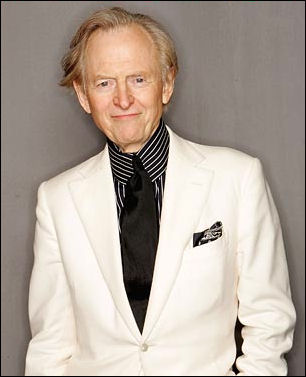
And there has never been a greater piece of LSD recruitment art in world history than Sgt. Pepper’s Lonely Hearts Club Band. I won’t go into the particulars of how the album’s lyrics and general transformative spirit inspired milions of kids to follow the Beatles on their spiritual path. Rosen’s piece alludes to it here and there; the “drugs” chapter on Wikipedia’s Sgt. Pepper page spells it out pretty clearly.
Before Sgt. Pepper, only rock musicians and various other elites in cities and upscale universities were taking LSD and reading dog-eared paperback copies of the Bhagavad Gita. After Sgt. Pepper, the enlightenment-through-LSD ball game became a mass middle-class thing, thus triggering the above-described spiritual revolution.
The downside is that the mass middle-class element diluted the pseudo-cloistered spiritual purity and coolness of then then-nascent hippie movement. This led to a kind of downmarket mongrelization effect — middle-class dropout runaways looking for spare change in the East Village and Haight-Ashbury, using odious, amphetamine-spiked psychedelic drugs sold by scumbags. This gradually resulted in a degenerative hip-fringe meltdown and that famous September 1967 Haight Ashbury parade proclaiming the “death of Hippie.”
Peter Fonda‘s Terry Valentine character says it concisely in Steven Soderbergh‘s The Limey. The legendary “’60s” boiled down an eighteen-month period, he says — “It was ’66 and half of ’67….that’s all it was.”
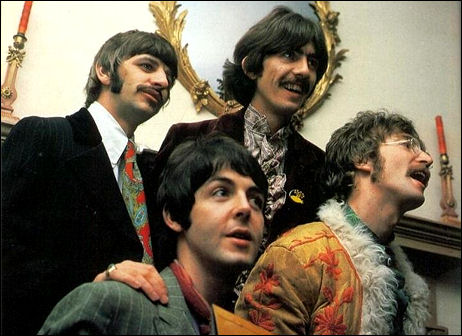
Rosen, yes, is mainly writing about the music of Sgt. Pepper, but the fact that she doesn’t even mention what this album engendered in American society, not even anecdotally, is one of the most bizarre examples of what editorial p.c. thinking brings about when the whip has been cracked once too often. Rosen’s piece is like someone writing about J.M. Flagg‘s famous “I Want You”/Uncle Sam recruiting poster of 1917, and not mentioning a little thing that was going on at the time called World War I.
Here’s Rosen’s sum-up paragraph about Sgt. Pepper‘s impact:
“If Sgt. Pepper’s Lonely Hearts Club Band doesn’t have a concept, it does have a theme. It’s a record about England in the midst of whirling change, a humorous, sympathetic chronicle of an old culture convulsed by the shock of the new — by new music and new mores, by rising hemlines and lengthening hair and crumbling caste systems. In short, it’s a record about the transformations that the Beatles themselves, more than anyone else, were galvanizing.” Rising hemlines!
If there are any under-25s out there haven’t read Wolfe’s “The Me Decade and the Third Great Awakening,” please, please read it now. It’s one of the most brilliant and incisive piece of 20th Century social analysis ever written. And one of the funniest.
